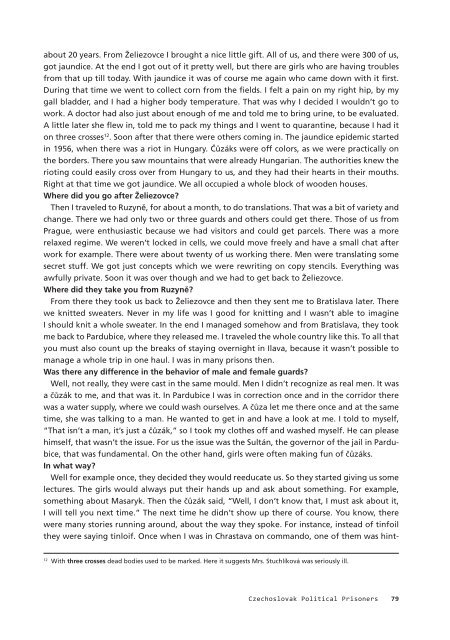Czechoslovak Political Prisoners - über das Projekt Political ...
Czechoslovak Political Prisoners - über das Projekt Political ...
Czechoslovak Political Prisoners - über das Projekt Political ...
You also want an ePaper? Increase the reach of your titles
YUMPU automatically turns print PDFs into web optimized ePapers that Google loves.
about 20 years. From Želiezovce I brought a nice little gift. All of us, and there were 300 of us,<br />
got jaundice. At the end I got out of it pretty well, but there are girls who are having troubles<br />
from that up till today. With jaundice it was of course me again who came down with it first.<br />
During that time we went to collect corn from the fields. I felt a pain on my right hip, by my<br />
gall bladder, and I had a higher body temperature. That was why I decided I wouldn’t go to<br />
work. A doctor had also just about enough of me and told me to bring urine, to be evaluated.<br />
A little later she flew in, told me to pack my things and I went to quarantine, because I had it<br />
on three crosses 12 . Soon after that there were others coming in. The jaundice epidemic started<br />
in 1956, when there was a riot in Hungary. Čůzáks were off colors, as we were practically on<br />
the borders. There you saw mountains that were already Hungarian. The authorities knew the<br />
rioting could easily cross over from Hungary to us, and they had their hearts in their mouths.<br />
Right at that time we got jaundice. We all occupied a whole block of wooden houses.<br />
Where did you go after Želiezovce?<br />
Then I traveled to Ruzyně, for about a month, to do translations. That was a bit of variety and<br />
change. There we had only two or three guards and others could get there. Those of us from<br />
Prague, were enthusiastic because we had visitors and could get parcels. There was a more<br />
relaxed regime. We weren’t locked in cells, we could move freely and have a small chat after<br />
work for example. There were about twenty of us working there. Men were translating some<br />
secret stuff. We got just concepts which we were rewriting on copy stencils. Everything was<br />
awfully private. Soon it was over though and we had to get back to Želiezovce.<br />
Where did they take you from Ruzyně?<br />
From there they took us back to Želiezovce and then they sent me to Bratislava later. There<br />
we knitted sweaters. Never in my life was I good for knitting and I wasn’t able to imagine<br />
I should knit a whole sweater. In the end I managed somehow and from Bratislava, they took<br />
me back to Pardubice, where they released me. I traveled the whole country like this. To all that<br />
you must also count up the breaks of staying overnight in Ilava, because it wasn’t possible to<br />
manage a whole trip in one haul. I was in many prisons then.<br />
Was there any difference in the behavior of male and female guards?<br />
Well, not really, they were cast in the same mould. Men I didn’t recognize as real men. It was<br />
a čůzák to me, and that was it. In Pardubice I was in correction once and in the corridor there<br />
was a water supply, where we could wash ourselves. A čůza let me there once and at the same<br />
time, she was talking to a man. He wanted to get in and have a look at me. I told to myself,<br />
“That isn’t a man, it’s just a čůzák,” so I took my clothes off and washed myself. He can please<br />
himself, that wasn’t the issue. For us the issue was the Sultán, the governor of the jail in Pardubice,<br />
that was fundamental. On the other hand, girls were often making fun of čůzáks.<br />
In what way?<br />
Well for example once, they decided they would reeducate us. So they started giving us some<br />
lectures. The girls would always put their hands up and ask about something. For example,<br />
something about Masaryk. Then the čůzák said, “Well, I don’t know that, I must ask about it,<br />
I will tell you next time.” The next time he didn’t show up there of course. You know, there<br />
were many stories running around, about the way they spoke. For instance, instead of tinfoil<br />
they were saying tinloif. Once when I was in Chrastava on commando, one of them was hint-<br />
12 With three crosses dead bodies used to be marked. Here it suggests Mrs. Stuchlíková was seriously ill.<br />
<strong>Czechoslovak</strong> <strong>Political</strong> <strong>Prisoners</strong> 79


